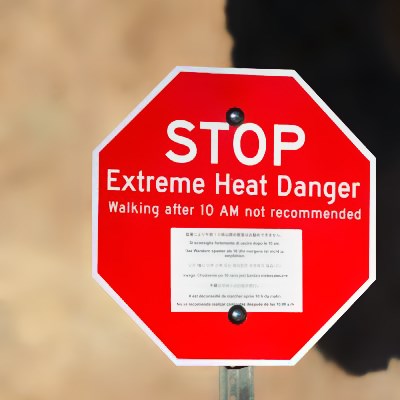This article aims to start a dialogue about urban heat and calls for transdisciplinary collaboration across health sciences and urban planning to find out how we can better respond through landscape planning research.
Heatwaves, defined as prolonged periods of abnormally high temperatures due to climate change, are becoming increasingly common and intense, which poses challenges to our cities and landscapes. The prognosis for 2023 is summer with record-breaking temperatures, and the European Center for Medium-Range Weather Forecasts has warned that temperatures might come close to or exceed the summer heat record in 2018. Cities, with vast infrastructures of dense buildings and impermeable surfaces, create an urban heat island effect – areas of even higher temperature than forests and water bodies.
In May of 2023 Amanda Gabriel, Alnarp Hub Coordinator at SLU Urban Futures, attended the “Hot Brain” Conference at the University College of London (UCL), whereas many studies in the fields of neurosciences and urban planning confirmed that heatwaves can cause alarming health consequences for humans at many physiological levels.
Neurological studies have shown that both short-term and prolonged exposure to heat waves at 38C degrees can impair many of our cognitive functions, such as attention, memory, and decision-making abilities. For some individuals, depending on age and health conditions, the risks are higher. Heatwaves pose a significant risk of heatstroke, a life-threatening condition that can result and brain damage, leading to neurological impairment, seizures, and even death, which poses challenges for already stretched health services in responding to and managing rising cases of heat-related illness.
Amanda Gabriel was surprised to hear from health researchers that parks can create a false perceived safety during heat waves.
– They explained that individuals that are at risk, for instance, due to older age, are not normally aware of the dangers of heat and end up going to outdoor areas. This lack of awareness that parks are not cool enough, creates potentially dangerous situations that lead to a higher rate of hospitalization of individuals during heatwaves, which is a challenge for the health systems and our city structures, says Amanda.
At SLU, we have many researchers that study how landscape architecture and forest planning can counteract this effect and create cooler and thus more resilient cities. As landscape architects and urban planners, it is imperative to consider these risks and prioritize the creation of cooler environments in our planning and research. Developing our knowledge so that cities can use landscape architecture collaboratively with the health field and municipality planning and management, has an important role in ensuring the future health of our cities and citizens.
